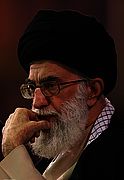Khamenei Has Lost Legitimacy
» Principlists Admit
The response from ayatollah Khamenei’s office to a question about the criteria of allegiance to the supreme leader did not trigger responses only from government opponents and critics; it also opened the door for a group of ideologue Principlists - who support ayatollah Khamenei and the institution of the supreme leader - to begin new debates about the supreme leader’s rule. The debates were opened by supporters of the Islamic republic supreme leader for the first time, signaling their discontent with the leader’s performance.
The principlists entered the debate from different angles, however. Amir Mohebian, a senior editor at Resalat daily (affiliated with the traditional right-wing), warned against “damages to the legitimacy of the ruling individual in the Islamic Republic” and called for “rebuilding the Islamic Republic’s sources of power.”
Mohebian’s remarks can be regarded as the first public admission by principlists of the weakening status of the Islamic Republic supreme leader’s in Iran’s political structure, although experts pointed to signs of such weakening as early as last year.
In his editorial, Mohebian warned principlists that “reliance on the element of punishment or the government’s coercive power as the sufficient element for survival is shortsighted.”
Following Mohebian’s editorial, another prominent principlist figure began an unprecedented criticism of the concept of supreme leadership and its powers and responsibilities.
In an article, Ali Shokouhi, the editor-in-chief of the now-closed Arzeshha weekly (affiliated with the Society for the Defense of Values of the Islamic Revolution, headed by ayatollah Mohammadi Rayshahri) and the head of the Farda news website (affiliated with Tehran mayor Mohammad Bagher Ghalibaf), criticized the “holification” of the supreme leader and the diminishment of the supervisory role of the Assembly of Experts, technically in charge of supervising the supreme leader’s performance.
Shokouhi, who is also oversees cultural affairs at the Jam-e Jam Foundation (affiliated with the state radio and television corporation), emphasized that he is a defender of the theory of supreme leadership. Nevertheless, he regarded “supervising the ruling leader’s performance and qualifications” as “a necessary element of the theory of supreme leadership.”
Noting that “these days, the concept of supreme leadership is interpreted and described in the worst possible manner,” Shokouhi referenced ayatollah Khomeini’s views on the issue and wrote, “There is no reason for supreme leadership to belong to one individual, even if that one individual has all the necessary qualifications. In reality, the absoluteness of the supreme leadership’s rule refers to the authority of the government, not the authority of one person.”
Shokouhi concluded his article by making several suggestions, including “the imposition of time-limits and other restrictions on supreme leadership,” maintaining the independence of the Assembly of Experts,” and “acknowledging the right of other government institutions in imposing their authority in accordance with the law.”


